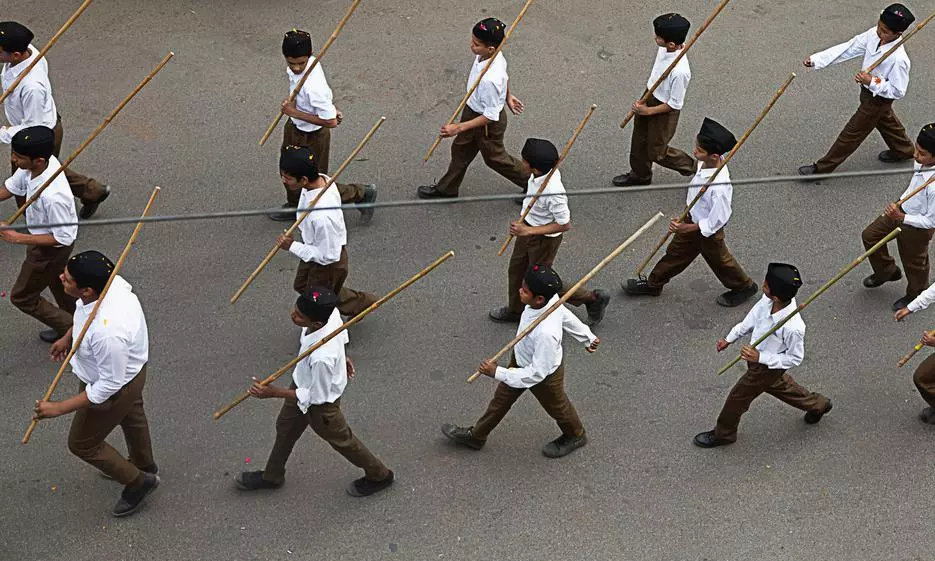
Grow your own cadres, RSS tells BJP, other Sangh Parivar affiliates
Plan is for BJP to recruit and train full-time and part-time workers for its political work while RSS deploys its workforce for social work in India and abroad

Amid the ongoing seven-phase Lok Sabha elections, the ruling party’s ideological parent, the Rashtriya Swayamsevak Sangh (RSS), has asked all its 36 affiliates, including the BJP, to become self-reliant and gradually raise and train their own workers.
This was told to The Federal by senior members of the Sangh Parivar.
Its other affiliates such as the trade union Bharatiya Mazdoor Sangh (BMS), Bharatiya Kisan Sangh (BKS) and Vishwa Hindu Parishad (VHP) .have their own cadre and full-time workers and are not dependent on RSS pracharaks.
Senior RSS leaders have now asked the BJP leadership to similarly work towards raising their own army of full-time and part-time workers. These workers will then act as a dedicated workforce for the BJP, paid by the party for their services.
Currently, the BJP depends on RSS workers to a large extent to carry out the ground work for the party.
RSS expansion plans
According to RSS members, the Sangh felt the need for more manpower to expand its own work within and outside India, hence the message to the affiliates to grow their own workforce.
Keen to work with Indians living abroad, the RSS wants to send some of its full-time members to work in the Hindu Swayamsevak Sangh (HSS), a RSS affiliate in the US, Europe, Australia, and Southeast Asian countries.
The RSS also needs more manpower to work in its healthcare projects and in hospitals being developed in Maharashtra and other parts of India.
Dilip Deodhar, Nagpur-based senior RSS observer, told The Federal: “The RSS is a social organisation and the BJP is a political organisation. It is true that some full-time RSS workers become part of the BJP but essentially RSS is a social and cultural organisation. It is for this reason that the RSS has asked the BJP to raise its own manpower, so that RSS's full-time workers can be used in other areas."
He added that ideologically there is "no difference" between BJP and the RSS. Earlier, when the BJP was rather "weak", RSS workers would help the party in organisation-building but now the BJP should raise its own workforce, Deodhar asserted.
Gradual withdrawal at grassroots level
According to the plan, the BJP will henceforth try to build their own cadre, and the RSS will gradually reduce the number of pracharaks, or the unmarried full-time workers, who are 'leased' to the party for organisation-building.
Although the RSS will continue to provide pracharaks to the BJP at the national level or even in the states, its district-level workers will be gradually withdrawn, and the BJP will have to fill the gaps with its own dedicated manpower at the grassroots level.
Vinod Bansal, VHP national spokesperson, said there is nothing new about the RSS request. “The VHP has several RSS pracharaks but there are thousands of VHP workers who have been recruited and trained by the VHP for its different organisations like Bajrang Dal, Durga Vahini and others," he told The Federal. "We started raising our own workers a long time ago, so this call is not new for the VHP.”
Further, he said, the RSS leadership has always told the affiliate organisations that there is a need to become “self-reliant” and have their own dedicated manpower who can take forward their work.
BJP gets 'self-reliant'
The recent public statement made by BJP president JP Nadda, that the BJP has become more “self-sufficient now” and can manage its own affairs, is also seen as a step towards the saffron party becoming more self-reliant in the coming days.
The process has been on for a few years, say BJP members. The party's decision to increase its membership to 11 crores was also to improve its manpower strength for party work in constituencies and to work at the grassroots level.
The idea is to build two types of a work force – full-time workers who will only work for the BJP and get paid for their services by the party, and part-time workers, who will do short stints, such as for two to six months, or a full year.
Dry run
Almost two months before the announcement of the 2024 general elections, the BJP leadership started a pan-India mass contact initiative called Viksit Bharat, which was spearheaded by Prime Minister Narendra Modi, who personally visited every state to take part in public meetings.
BJP senior leaders explained that the Viksit Bharat programme was not just held to reach out to more than 40 crore beneficiaries of different populist programmes of the Union government like the Ujjwala or Jan Dhan schemes, but also to test the party's organisational strength.
The party workers visited the homes of every beneficiary, especially in rural areas, to check whether BJP has the capacity to carry on with its work on its own, said the leaders.
“It is not that RSS workers will not help the BJP. The full-time workers or pracharaks will continue to be present at the national level and at the state level, but the BJP will have to do its own work at the grassroots levels. Gradually, the RSS will start to withdraw its full-time workers from all 36 organisations,” Deodhar told The Federal.

